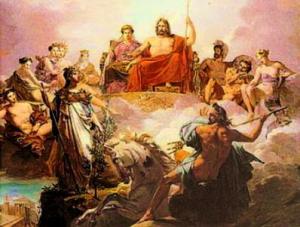More Culture Topics
- Ancient Greek Religion
- Greece Movie
- Greek Architecture
- Greek Art
- Greek Bible
- Greek Columns
- Greek Costumes
- Greek Culture
- Greek Jewellery
- Greek Key
- Greek Masks
- Greek Music
- Greek New Testament
- Greek Orthodox
- Greek Philosophers
- Greek Pottery
- Greek Radio
- Greek Religion
- Greek Sculpture
- Greek Tattoos
- Greek Temples
- Greek Theater
- Greek Tv
More Topic Categories
Related Destinations
Ancient Greek Religion
 Ancient Greek religion includes the various beliefs and rites that took place in Ancient Greece through cults and were part of Greek mythology. The rites of Ancient Greeks were also prevalent at Ionia in Asia Minor, Magna Graecia (Sicily and south Italy) as well as other Greek colonies in Western Mediterranean such as Marseilles. The Greek religion influenced heavily the religious beliefs of Etruscans and Romans.
Ancient Greek religion includes the various beliefs and rites that took place in Ancient Greece through cults and were part of Greek mythology. The rites of Ancient Greeks were also prevalent at Ionia in Asia Minor, Magna Graecia (Sicily and south Italy) as well as other Greek colonies in Western Mediterranean such as Marseilles. The Greek religion influenced heavily the religious beliefs of Etruscans and Romans.The period of the Minoan and Mycenaean civilizations is of particular interest in the academic circles concerning their religious rites and beliefs. There is a prevailing theory, according to which during this prehistoric period, people believed in a universal nature goddess and her male counterpart, who represented the calendar cycle of natural vegetation. The religion was also strongly linked to God Helios (the Sun), the bringer of light and Spring.
After the fall of the Mycenaean civilization, the worship rites changed. New cult centres were created, and heroic cults were developed. Before the creation of the 12 Gods of Olympus, many of the gods were already worshipped all over Greece, as can be seen by the temples of Artemis, Zeus, Apollo or Apello, Athena and Poseidon, in Athens, Peloponnese and Samos. These scattered beliefs were later organized, mainly thanks to the works of Homer and Hesiod, who roughly established the standard Greek pantheon, despite local differentiations. During this period, with the development of philosophy, early metaphysical beliefs also start appearing, such as Pythagorism and Orphism, as well as local mystic cults such as the Eleusinian Mysteries, the Mysteries of Dionysus and the Caberian Mysteries.
During the Classical Age, the cults and some philosophical schools such as Pythagorism and Platonism, offer a full metaphysical and ethical system intertwined with ancient myths. It was at this period that Plato suggested a radical belief that there is one higher being, God, the source of existence and function of the world. This kind of radical beliefs clashed with the local worship and tradition, resulting in events such the execution of Socrates.
See Also:
 Athens Photos
Athens Photos
 Santorini Photos
Santorini Photos
 Crete Photos
Crete Photos
 Meteora Photos
Meteora Photos
 Corfu Photos
Corfu Photos




